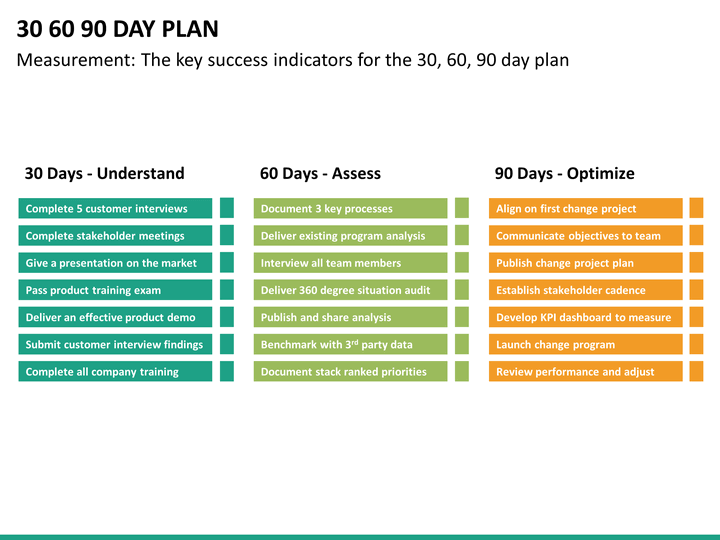

In the last two sections of your exercise file, include those boring tasks you've got to get done in onboarding, and there's a space to include links to anything your colleagues tell you to review to be a quick study of the company or the industry. And anything like this will help you to learn quickly on the job and help you to immediately earn respect. It was honestly the best 90-day goal I could have asked for. It was a lofty goal, and in the process, I deeply learned the company culture, the product lines, the leadership team. Finally, by the time you hit the 90-day mark, what should you have achieved that will set you up for success in the following months? When I started another job, my 90-day goal was to throw an all-company retreat in Utah. Progress is more important than perfection here.

Look for those things that you can accomplish quickly. I was able to put together foundational recruitment processes in the first 60 days that dramatically relieved the team. I identified several important goals, and the first one was to clean up the recruitment process. I spent the first 30 days understanding the company and speaking with every leader and any employee that I could get on my calendar. I remember when I was hired to lead human resources, the company didn't give me any goals. Additionally, I've included some ideas for goals in the exercise files. Determine what your 90-day goals should be, based on the insight from everything you have listed above on your planning document. The fourth section is the 90-day goals, the part we've all been waiting for. Ask your manager and colleagues for ideas of who you should speak with. At any new job, you should spend your first month heavily focused on meeting people in the business. Ask them questions about which duties are the highest priority, and what are some of the goals associated with those duties? The third section is the listening tour.

Acquire a copy of the job description for this role and review it with your manager. This section can be quickly filled out in a meeting with your manager. And that is going to be invaluable when determining where to spend your own time. In your onboarding process, ask others' goals and responsibilities. The first section is important department context. Let's look at the exercise file and put in anything your manager has already provided for you and then add anything they missed. If you have a well-organized manager, they have already created a plan for you, or at least set your 90-day goals, though not all of us are quite so fortunate to have a leader like that. How do you know if you're successful at your new job? It's normal to start a new job, look around and think, "Am I living up to their expectations?" What's so important is to establish a realistic 90-day plan that will be the roadmap that will help you and your manager to align on what success looks like in your role.


 0 kommentar(er)
0 kommentar(er)
